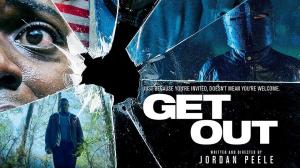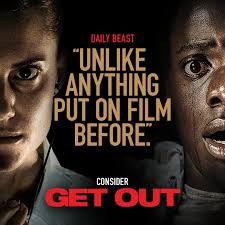The Movie “Get Out” – Suspense And Racial Metaphors
The previews promoted the movie Get Out as a horror or comedy movie. I’m not a big fan of horror movies so didn’t make time to see it in the theater. When the movie became available On Demand, I watched it. In fact, I’ve watched it about 5 times.
Get Out was nominated for, and won many awards, including the Academy Award for Best Original Screenplay and the Golden Globes for Best Motion Picture, Musical or Comedy. Those selecting movies for nominations just didn’t know what category to use for Get Out. I categorize it as a suspense movie. There’s some science fiction stuff in it but overall, the movie is about aversive racism.
If you haven’t seen Get Out, there are spoilers in this post, but I promise you, even the spoilers will help increase your enjoyment and understanding of the movie.
Some Whites reading this might feel uncomfortable. Some might feel insulted. Some might see it as an eye-opener to check their own sense of entitlement because truly, people with entitlement characteristics tend to use the same manipulative schemes to try to get what they want from everyone, regardless of race.
 Some have accused Get Out of promoting distrust and hatred of Whites. It doesn’t. The movie doesn’t have to create distrust. It is telling Whites what most Blacks already know about aversive racism and its bed partner, White entitlement.
Some have accused Get Out of promoting distrust and hatred of Whites. It doesn’t. The movie doesn’t have to create distrust. It is telling Whites what most Blacks already know about aversive racism and its bed partner, White entitlement.
The movie tells the story of a White family whose ideologies include that Whites are superior in intelligence, while Blacks are physically superior. Even the one character whose brain was newly implanted into a Black body, spoke of his Black experience in terms of spending more time doing chores. In other words, he’s attempting to validate the idea that Blacks are created for servitude and physical labor.
The grandfather of the Armitage family developed the means to transplant the brains of Whites into the bodies of Blacks, while leaving enough of the victim’s brain so the victim becomes a spectator of how the White recipient is using their body.
The children of the family include a son named Jeremy, who likes to physically challenge Black men’s strength and so, uses sleep holds and physical force to kidnap and restrain them. The mother, Missy, is a hypnotherapist who has developed a technique to put victims in a “sunken place”. The dad is a neurosurgeon. Jeremy’s sister is Rose. More about Rose later.
Good directors usually place an object or an action near the beginning of the movie to tell us something and to watch for it in the film. We see the symbol again in the middle and again towards the end of the movie. In Get Out, the first symbolism is a deer, hit by the vehicle driven by Rose while Chris, her next unknowing victim, is passenger.
Chris gets out of the vehicle and follows the cries of the deer, who we see dying from its injuries. Law enforcement is called, and the officer wants to see Chris’ identification although Chris was not driving. Rose comes to the rescue challenging the officer, and it appears that she is all for equality. We do not realize until later in the movie that the last thing Rose wanted was for law enforcement to have a record of Chris’ identity and last being seen with her. Her boyfriends end up on the missing persons list.
That scene is a classic for the proposition that some Whites give the appearance of protecting or speaking against inequalities, when their actions are instead, self-serving to protect themselves.
We also find that car accidents that leave the victim injured and dying on the side of the road is exactly what Missy uses to make Chris feel guilty so she can hypnotize him. His mom was victim of a hit and run when he was 11-years old. She was late coming home from work, and he did not call anyone or go out to look for her. Missy brought Chris back to a boy of 11-years old and made Chris, as a child, feel guilty saying, “You can’t move. You’re paralyzed just like that day when you did nothing. You did nothing.”
 Missy orders the 11-year old Chris to “sink” and the hypnotic trance sends him into a place that appears like outer space. The only light that appears is from what looks like a television screen where Chris can see and hear Missy, but he cannot move. His voice is not heard. Tears role down his face, and that tells us that even from the sunken place, the victim’s emotions can still be physically expressed. (We see this later in the movie with another character named Georgina.)
Missy orders the 11-year old Chris to “sink” and the hypnotic trance sends him into a place that appears like outer space. The only light that appears is from what looks like a television screen where Chris can see and hear Missy, but he cannot move. His voice is not heard. Tears role down his face, and that tells us that even from the sunken place, the victim’s emotions can still be physically expressed. (We see this later in the movie with another character named Georgina.)
There is also something else in that scene that is profound. It is in regards to how Missy convinces Chris that he needs hypnosis to stop smoking. The idea is that Missy wants Chris to stop smoking for the benefit of her daughter, when the hypnosis is actually intended to subjugate him to give his mind over to her. The seeds of subjugation is to convince Blacks that if they want to associate with Whites, they have to give up something, change something, do things differently, for the purported protection of the White family.
Towards the end of the movie, we see the symbolism of the deer again. It’s the head of a buck, kept as a trophy by Rose’s dad. Only this time, Chris is able to use the trophy as a weapon so he can escape.
Before Chris knows what is happening and makes his escape, Rose’s family has a gathering where they hold a silent auction to sell Chris to the highest bidder. The highest bidder happens to be Jim Hudson, a blind art dealer who admires Chris’ work as a successful photographer. When they first meet, Jim tells Chris that he thinks the other Whites are ridiculous. He showers Chris with compliments about his photography skills. Chris is made to think that Jim is cool.
When Chris learns that Jim plans to live the rest of his life through Chris’ body, Jim tells him that he doesn’t care about Chris’ race — he wants his eye for photography. Jim is entitled to use/take what Chris has and is, with or without his permission. Jim personifies aversive racism.
Chris’ escape also involves the use of cotton. While in bondage to a chair, Chris sees that he has scratched the upholstered arms until the stuffing shows. He stuffs his ears so he cannot hear the trigger sounds that Missy uses to send him into the sunken place. That is powerful symbolism because as slaves, Blacks were placed in bondage and made to pick cotton. What Chris shows us is that we have to shut-out things that take away our freedom, our individuality, and ability to make our own decisions.
The director, Jordan Peele, describes the sunken place as a metaphor for how Blacks are marginalized; that no matter how loudly Blacks scream, the system silences them. The system has the power to place in bondage; to diminish all that is life, liberty, and pursuit of happiness for the benefit of Whites.
 More about Rose. Another character in the movie is Chris’ best friend Rod. Rod is the only person who Chris phones while at Rose’s parents’ house. Based on information they exchanged, Rod exclaims that Missy is brainwashing Black men into being sex slaves. When Chris does not return home as planned, Rod goes to the police and tells them the same.
More about Rose. Another character in the movie is Chris’ best friend Rod. Rod is the only person who Chris phones while at Rose’s parents’ house. Based on information they exchanged, Rod exclaims that Missy is brainwashing Black men into being sex slaves. When Chris does not return home as planned, Rod goes to the police and tells them the same.
The police do not take Rod seriously. It’s almost a joke — why would men of any race need to be brainwashed in order for them to want sex? Is that a crime? However, Rod was correct in one sense. There is a sex slave in the movie. It is Rose. Her family pimps her out to meet Black men and women, and shower them with fake love so ultimately, her dad auctions them off for millions of dollars. It’s an alternative to Jeremy’s kidnapping.
Get Out is not only a message for Chris to get out of the house where he would be restrained and forced into surgery giving his body to a White purchaser. It’s also about getting out of the place where Whites manipulate thoughts and emotions upon Blacks to get them into that sunken place. (Put cotton in the ears to shut that crap out.) It brings new meaning to “a mind is a terrible thing to waste“.
Posted on 04/24/2018, in movies and tagged aversive racism, betrayal, Get Out, movie, race relations, trust, White entitlement. Bookmark the permalink. 11 Comments.







































LikeLiked by 1 person
Excellent post Xena. Very thought provoking
LikeLiked by 2 people
Thank you, supabutterfly Thanks for reading. It’s a bit longer than I usually write. The movie conveys so much that I could probably write a separate post for almost every scene. 🙂
LikeLiked by 1 person
Xena,
There is so much work to be done to rid our nation of White Supremacy and systemic racism. Your outstanding movie review of Get Out brings out this need for change because you describe so well all of the messages and symbols within the movie that point to the ugly oppression and manipulation dealt on the black community throughout our country's entire history.
Only when I, along with our nation, acknowledge and recognize the wrongs can a reckoning begin that repairs the damage and heals. I am so sorry and want so much to be part of the healing and the repairing.
Your post has had a deep impact on me and inspires me to keep on pushing back and advocating for change.
Thank you for all that you do and all that you share and alert us to through your blogging!
I appreciate you and all of the seeds for thought which you plant.
Again, much applause for your movie review and getting at the hard truths we and our nation need to hear.
I pray for change. I pray for racial justice and equality. I pray for the coming of the beloved community.
LikeLike
Xena, I did not end the italics after the movie title “Get Out.” and the rest of my comment went into italics. Would you please add the ending > to the </em ? Thanks 🙂
LikeLike
Yahtzee,
Thanks for the comment. The movie doesn’t deal with oppression on the Black community. In fact, the Blacks targeted by Rose are not presented in the stereotypical position of oppression and suffering. They had something that the White brain-transfer cult wanted. It shows us aversive racism.
LikeLiked by 1 person
Get Out was also very profitable. The film cost $ 4.5 million and made $ 255 million.
LikeLiked by 2 people
Chuquest,
Thanks for the info. It’s has already become a cult classic. I thought that maybe writing a review now would be late, but found that discussions about it continue on websites although the movie was released over a year ago.
LikeLike
i really need to watch this movie idk why its taking me so long to see it!!
LikeLiked by 1 person
Scotty,
At first I hesitated because it was reviewed as a horror movie. When I think of horror movies, I think of blood and guts for the sake of frightening viewers, along with characters who can’t be killed. I remember reading the description for “The Ring” and watching it to discover it’s a horror movie. When I rented “Get Out” On Demand, it was with friends and relatives watching it with me. I figured that if it was too much horror, that I could go in the kitchen while they freaked out. LOL!
LikeLiked by 1 person
LikeLike